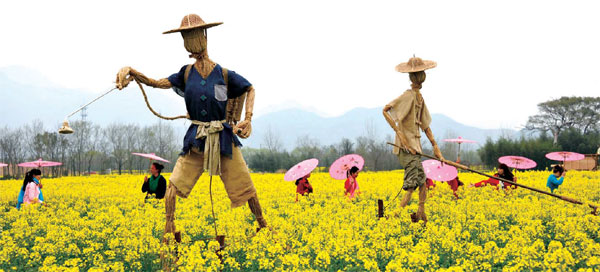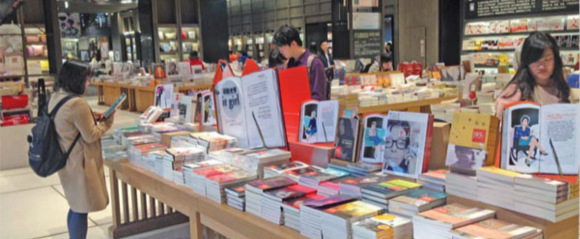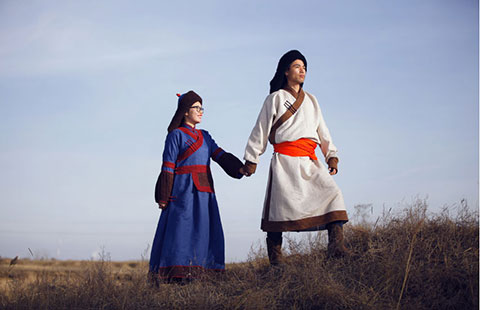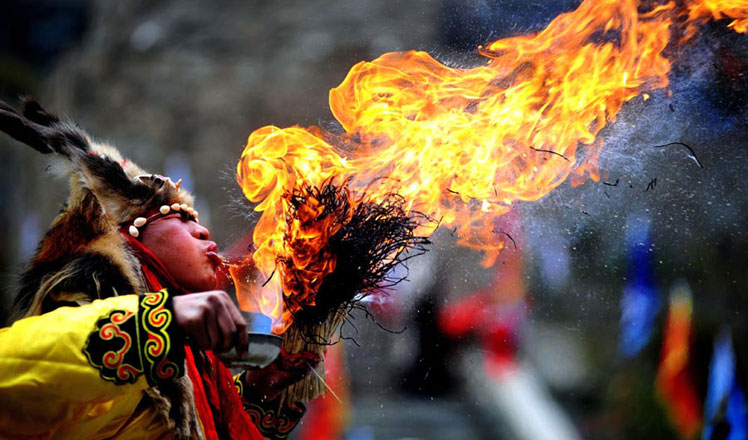Foods that honor the ancestors
Updated: 2016-04-01 08:30
By Pauline D Loh(China Daily Europe)
|
|||||||||

Qingming is the fourth of the five solar terms of spring, and it is set in a period when nature is lush and animals and insects are mating. Wang Huabin / For China Daily
Editor's note: To understand China you have to sit down to eat. Food is the adhesive that holds the Chinese social fabric together. In the face of increasing globalization, food is also one of the last strong visages of community and culture.
Chinese have been migrating overseas for a long time, many since the start of the revolutionary era in the early 1900s. Some left even earlier to seek fame and fortune, but mostly fortune.
It is these ethnic Chinese in foreign lands who strove hardest to maintain and record ancestral links. Within China itself, many traditional festivals, customs and rituals were almost completely eradicated.
For a time, it was the Chinese living overseas who faithfully kept the ancient rites alive. One good example is the Festival of Pure Brightness or Qingming, also known as Tomb Sweeping Day.
In the West, the nearest equivalent would be All Souls' Day, when the dead are remembered.
In traditional Chinese culture, ancestral worship is a big part of who you are, and of knowing where you came from.
Qingming is when graves are carefully swept clean of the previous year's debris and the overgrown grass. It is also a day when the whole family will gather, pay respect and remember those who have gone before them.
As ethnic Chinese living abroad, my family had no access to the ancestral graves, but we always set up a table loaded down with the best dishes at home to honor the ancestors.
Three cups of wine would be ceremonially set out on the table. Or, as in our family, three cups of the best tea would be offered. I even remember that the teacups often had a dried red Chinese jujube soaking in the wulong tea.
When I came to China all those many years ago, I could not understand why Qingming was not remembered with as much pomp and pageantry.
My husband later explained that at the height of revolutionary fervor, it became a memorial day with a difference. In Beijing, for instance, hundreds of thousands would march into Tian'anmen Square and lay wreaths at the Monument to the People's Heroes, the obelisk that honors heroes sacrificed in the name of revolution. In other parts of the country, there would be similar ceremonies.
In fact, it has only been relatively recently that Qingming was once again designated a public holiday, to privately pay respect within the family.
Away from Beijing, the heart of China, other regions have been quick to revive the food and rituals associated with this festival, which is also a jieqi or solar term in the Chinese calendar.
Qingming is the fourth of the five solar terms of spring, and it is set in a period when nature is lush and animals and insects are mating.
One of the most important ingredients of a lot of food associated with Qingming is aicao, or mugwort. It is an edible wild herb that is supposed to prevent and even cure toxic insect bites. It is also reputed to chase away undesirable reptiles like snakes, a bit like garlic with vampires.
South of the Yangtze River, especially where wild mugwort is abundant, it is gathered and made into traditional cakes during the festival.
In certain provinces and tribal communities, huge bunches of mugwort are often dried and still hung on doorways as a talisman against evil vapors.
In Jiangsu and Zhejiang provinces, pounded mugwort is juiced then added to glutinous rice and molded into verdant, smooth, silky round cakes called qing tuanzi.
In other communities, the mugwort is simply chopped up then added to glutinous rice flour and formed into dark green ingots called aiban. Often these mugwort cakes have sweet fillings.
In the old days, Qingming and grave sweeping would mean a whole day's excursion out into the countryside. The families would have to pack enough food to place before the graves, and then feed themselves.
For this reason, Qingming is also known as Hanshi Jie, or the Festival of Cold Food.
In certain provinces, the logistics of all that became the equivalent of planning an elaborate picnic.
In Fujian province, from the capital Fuzhou to the famous coastal city Quanzhou, different versions of spring rolls are eaten.
The crepe-like skin can be made from either an egg batter or just plain flour and water. The filling, though, is almost invariably a vegetarian mixture of bean sprouts, turnips, chives, grated carrots or slivered leafy greens. The rolled up pancakes were easy to carry and easy to eat.
Further up north, steamed breads, or momo, were equally portable. To differentiate them from the daily staples, these steamed buns were often decorated with red Chinese jujubes to please the ancestors.
The more nimble-handed domestic goddesses would make the buns into the shapes of various animals, the mythical dragon being the most popular. Sometimes the dried fruit would be steamed and mashed, added to the dough and made into a fluffy jujube cake.
My husband tells me in Beijing, the common folk used to commemorate Qingming with a very simple fried snack. Long strings of dough would be deep fried into crispy bundles called sanzi.
But the times, they are a-changing.
As Chinese emigrants assimilate and adapt to new homes, their children may slowly forget about the meaning of remembering remote ancestors.
Even in China, the accepted way is cremation rather than burial these days as land becomes scarcer. There are fewer and fewer graves to visit. Very soon the Festival of Pure Brightness may simply be another day to enjoy eating little green balls of sticky cake or an occasion for the family to come together to feast on spring rolls or jujube cakes.
Perhaps, just perhaps, they may spare a thought in their hearts for the origin of the festival and those long gone before.
paulined@chinadaily.com.cn
Today's Top News
A fresh start
Bookshops reinvent themselves
Xi-Obama bilateral talk to advance ties
Foreign companies reassured on new Internet rules
Beijing and Prague form new key link
Trump drops pledge to back Republican nominee
China, Czech Republic set up strategic partnership
EgyptAir hijacker arrested, all passengers freed
Hot Topics
Lunar probe , China growth forecasts, Emission rules get tougher, China seen through 'colored lens', International board,
Editor's Picks

|

|

|

|

|

|






